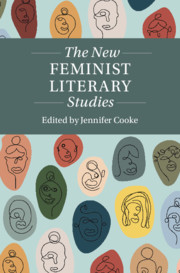Book contents
- The New Feminist Literary Studies
- Twenty-First-Century Critical Revisions
- The New Feminist Literary Studies
- Copyright page
- Contents
- Illustrations
- Contributors
- Introduction
- I Frontiers
- II Fields
- III Forms
- Chapter 11 Feminist Dwellings: Imagining the Domestic in the Twenty-first-century Literary Novel
- Chapter 12 Who Rules the World? Reimagining the Contemporary Feminist Dystopia
- Chapter 13 Transnational Feminism and the Young Adult Novel
- Chapter 14 Feminist Manuals and Manifestos in the Twenty-first Century
- Chapter 15 ‘This is not a memoir’: Feminist Writings from Life
- Chapter 16 Feminist Poetries of the Open Wound
- Bibliography
- Index
Chapter 13 - Transnational Feminism and the Young Adult Novel
from III - Forms
Published online by Cambridge University Press: 16 November 2020
- The New Feminist Literary Studies
- Twenty-First-Century Critical Revisions
- The New Feminist Literary Studies
- Copyright page
- Contents
- Illustrations
- Contributors
- Introduction
- I Frontiers
- II Fields
- III Forms
- Chapter 11 Feminist Dwellings: Imagining the Domestic in the Twenty-first-century Literary Novel
- Chapter 12 Who Rules the World? Reimagining the Contemporary Feminist Dystopia
- Chapter 13 Transnational Feminism and the Young Adult Novel
- Chapter 14 Feminist Manuals and Manifestos in the Twenty-first Century
- Chapter 15 ‘This is not a memoir’: Feminist Writings from Life
- Chapter 16 Feminist Poetries of the Open Wound
- Bibliography
- Index
Summary
The increasing popularity of young adult fiction has been most often linked to the blockbuster success of North American series adapted into movie cycles, including The Twilight Saga (20058), The Hunger Games Trilogy (200810), and The Divergent Series (201113). Across these novel-to-film franchises, the centrality of a female heroine has spurred a number of critical debates about the feminism or antifeminism of the young adult genre. However, these debates have neglected a wealth of young adult fiction written beyond the USA. These conversations look very different when we begin to consider feminism in a transnational landscape, to include conflicts between Western and non-Western conceptions of agency, international development police directed towards youth populations, an international division of gendered labour practices, and diaspora perspectives on the family as a unit of social reproduction. This chapter outlines how a transnational perspective changes the way we articulate both gender and adolescence, using the young adult novel as a literary site wherein these intersecting identities are catalysed.
- Type
- Chapter
- Information
- The New Feminist Literary Studies , pp. 182 - 193Publisher: Cambridge University PressPrint publication year: 2020

